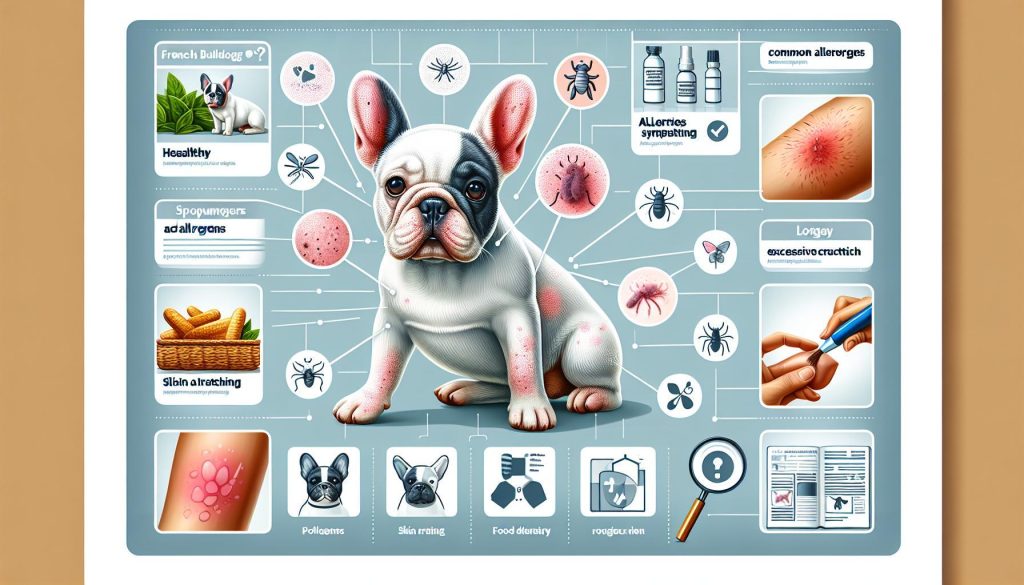About
How to Spot Allergies in Your French Bulldog
Page Contents
French Bulldogs are beloved for their playful personalities and distinctive bat-like ears, but they are also prone to allergies that can affect their quality of life. As a responsible pet owner, it’s crucial to recognise the signs of allergies early to ensure your furry friend stays healthy and happy. From itchy skin to digestive issues, French bulldogs can exhibit a range of symptoms that may indicate an allergic reaction. In this article, we’ll explore common allergens, how to identify symptoms, and the steps you can take to provide relief for your pet. Understanding these signs can make a world of difference in your dog’s well-being.
Recognizing Common Allergy Symptoms
French Bulldogs, with their adorable wrinkled faces and playful demeanor, can be especially prone to allergies. Recognizing symptoms early can make a significant difference in their comfort and health. **Common allergy symptoms** frequently enough manifest in ways that might seem unrelated at first, but paying attention to these signs can be crucial:
- Itching and Scratching: Persistent scratching, especially around the face, paws, and belly, is a telltale sign. Look for redness or irritation in these areas.
- Red or Inflamed Skin: Allergies can cause skin to become red,inflamed,or even develop rashes. This is frequently enough noticeable on the belly or between the folds of their skin.
- Ear Infections: Frequent ear infections or a noticeable increase in ear scratching might indicate a reaction to allergens.
- Watery Eyes: Excessive tearing or discharge from the eyes can be a symptom of an allergic reaction.
- Respiratory Issues: Snorting, wheezing, or coughing might suggest that your French Bulldog is reacting to airborne allergens.
While these symptoms can be indicative of allergies, they can also be signs of other health issues. It’s significant to consult with a veterinarian to confirm the cause and determine the best course of action.Early detection and treatment can help manage symptoms and improve your French bulldog’s quality of life.
Identifying Food Allergies in Bulldogs
Food allergies in French Bulldogs can be tricky to identify, but understanding the signs can make a significant difference in your pet’s comfort and health. **Common symptoms** include persistent itching,chronic ear infections,and gastrointestinal issues such as vomiting or diarrhea.If you notice your Frenchie frequently scratching or biting their skin, especially around the paws, ears, or belly, it might be time to evaluate their diet.
To pinpoint the specific allergen, consider conducting a food elimination trial. This involves feeding your bulldog a novel protein and carbohydrate source that they’ve never eaten before, such as duck and sweet potato, for about 8-12 weeks. During this period, it’s crucial to avoid giving them any other treats or foods. Keep a close eye on any changes in symptoms, and consult with your veterinarian to ensure you’re on the right track.
- **Itching and scratching**: Look for excessive scratching around the face, paws, and belly.
- **Ear infections**: Recurring infections can be a sign of a food allergy.
- **Digestive issues**: Vomiting, diarrhea, or gas might indicate a problem with their diet.
By being vigilant and proactive, you can help manage and alleviate food allergies in your French Bulldog, ensuring they lead a happy and healthy life.
Environmental Allergens to Watch For
French Bulldogs, with their adorable wrinkled faces and compact bodies, are sadly prone to allergies, especially those triggered by environmental factors. Identifying these allergens is crucial in keeping your furry friend comfortable and healthy. Here are some common environmental allergens to be vigilant about:
- Pollen: Just like humans, French Bulldogs can suffer from pollen allergies. During peak pollen seasons, you might notice your dog sneezing more often or rubbing their face against surfaces.Consider keeping windows closed during high pollen counts and wiping your dog’s paws and fur with a damp cloth after outdoor activities.
- Dust Mites: These microscopic creatures thrive in household dust and can trigger allergic reactions in dogs. Regularly vacuuming your home, washing your dog’s bedding in hot water, and using air purifiers can help reduce dust mite exposure.
- Mold Spores: Mold can grow in damp areas of your home, such as bathrooms and basements. ensure these areas are well-ventilated and dry, and clean any visible mold promptly. Mold exposure can lead to respiratory issues and skin irritation in your French Bulldog.
- Grass: Some dogs are allergic to certain types of grass. If you notice your dog scratching more after rolling around on the lawn, it might be a grass allergy.Rinse their paws and belly after they’ve been outside, and consider using hypoallergenic wipes.
Being aware of these potential allergens and taking proactive steps to minimize exposure can considerably improve your french Bulldog’s quality of life. Remember, if you suspect your dog is suffering from allergies, consulting a veterinarian is always the best course of action to ensure proper diagnosis and treatment.
Skin Reactions: Signs and Solutions
french Bulldogs, with their adorable wrinkles and compact build, are unfortunately prone to skin allergies. recognizing the signs early can help alleviate discomfort and prevent further complications. **common signs** of skin allergies in French Bulldogs include excessive scratching,licking,and biting at the skin. You might notice redness, rashes, or even bald spots developing on your dog’s body. In some cases, the skin may appear dry and flaky or develop a musty odor due to yeast infections.
To address these skin reactions, it’s crucial to identify the allergen. **Common culprits** include certain foods, environmental factors like pollen or dust mites, and even flea bites. Once the allergen is identified, you can take steps to minimize exposure. For food allergies, consider switching to a hypoallergenic diet. Regular cleaning of your dog’s bedding and using air purifiers can definitely help reduce environmental allergens. Additionally, maintaining a consistent flea prevention routine is vital.
If your French Bulldog’s skin condition doesn’t improve or worsens, consult a veterinarian. they may recommend **treatments** such as antihistamines, topical ointments, or specialized shampoos to soothe the skin. In some cases, allergy testing may be necessary to pinpoint the exact cause and develop a more targeted treatment plan. Remember, early intervention is key to ensuring your furry friend remains happy and healthy.
Testing and Diagnosis for Allergies
To effectively address allergies in your French Bulldog, a precise diagnosis is crucial. Veterinarians typically employ a combination of methods to identify specific allergens. **Skin tests** are a common approach, where small amounts of potential allergens are injected into your dog’s skin to observe any reactions. This method can be very effective in pinpointing environmental allergens, such as pollen or dust mites.
In addition to skin tests, **blood tests** can be utilized to measure the presence of allergen-specific antibodies in your dog’s bloodstream. These tests are beneficial for identifying food allergens and other substances that might not cause immediate skin reactions. Blood tests are less invasive and can be a preferred choice for dogs that have sensitive skin or other health concerns.
- **Elimination diets** are another diagnostic tool, particularly useful for food allergies. By systematically removing and then reintroducing potential allergens from your dog’s diet, you can observe any changes in symptoms.This method requires patience and careful monitoring but can be very revealing.
- **Observation** is key. Keep a detailed record of your French Bulldog’s symptoms, noting any patterns or triggers. This information can be invaluable for your veterinarian in determining the source of the allergy.
Collaborating closely with your vet, you can determine the most effective testing strategy for your French Bulldog, ensuring they receive the appropriate treatment and relief from their allergies.
Effective Allergy Management Strategies
- Dietary Adjustments: One of the most effective ways to manage allergies in French bulldogs is through careful dietary planning. Start by eliminating common allergens such as beef, chicken, or dairy from their diet and consider introducing a hypoallergenic dog food that uses novel proteins like duck or venison. Gradually reintroduce potential allergens to identify specific triggers. Always consult with a veterinarian before making significant changes to your dog’s diet.
- Regular Bathing and Grooming: Keeping your French Bulldog clean can significantly reduce allergen exposure. Use a gentle, hypoallergenic shampoo to bathe your dog regularly, which helps remove allergens from their coat and skin. Regular grooming also prevents the accumulation of allergens and keeps their skin healthy. Pay special attention to the folds of their skin, which can trap allergens and moisture, leading to irritation.
- Environmental Control: Minimize your dog’s exposure to environmental allergens by maintaining a clean living space. Use air purifiers to reduce airborne allergens and wash your dog’s bedding frequently. During peak allergy seasons, consider limiting outdoor activities, and wipe your dog’s paws and coat with a damp cloth after walks to remove pollen and other irritants.
Implementing these strategies can help alleviate allergy symptoms and improve your French Bulldog’s quality of life. It’s crucial to work closely with your veterinarian to tailor a management plan that suits your dog’s specific needs.
Dietary Adjustments for Allergy Relief
When it comes to alleviating allergy symptoms in your French Bulldog, making thoughtful dietary adjustments can be a game-changer. Begin by identifying potential allergens in your dog’s current diet. **Common culprits** include grains like wheat and corn, as well as proteins such as chicken or beef. Transitioning to a grain-free diet or opting for a novel protein source like duck, venison, or fish can significantly reduce allergic reactions.
Consider incorporating **omega-3 fatty acids** into your dog’s meals,known for their anti-inflammatory properties.These can be found in fish oil supplements or foods like salmon and flaxseed.Additionally, probiotics can support digestive health and strengthen the immune system, possibly reducing allergy symptoms. look for high-quality dog foods that include these beneficial ingredients or consult your veterinarian for supplement recommendations.
- **Avoid artificial additives**: Steer clear of foods with artificial colors, flavors, and preservatives, which can exacerbate allergies.
- **Introduce new foods slowly**: When changing your french Bulldog’s diet, do so gradually to monitor for any adverse reactions.
- **Consult your vet**: Before making significant dietary changes, it’s always wise to consult with your veterinarian to tailor a plan specific to your dog’s needs.
When to Consult Your Veterinarian
If your French Bulldog exhibits persistent symptoms that don’t seem to improve with basic interventions,it’s crucial to seek professional advice. **consult your veterinarian** if you notice any of the following signs:
- **Chronic Itching or Scratching:** If your pup is constantly scratching, licking, or biting themselves, it could indicate a more serious underlying issue that requires medical attention.
- **Recurring ear Infections:** Frequent ear infections are a common sign of allergies and can lead to more severe problems if not properly treated.
- **Gastrointestinal Distress:** persistent vomiting, diarrhea, or changes in appetite should never be ignored, as they can be symptoms of food allergies or other health concerns.
- **Swelling or Hives:** Any appearance of swelling, hives, or severe skin reactions necessitates an immediate visit to the vet.
**Professional diagnosis** is essential, as your veterinarian can conduct tests to identify specific allergens and recommend effective treatments. They may suggest allergy testing, dietary adjustments, or prescribe medications to manage your dog’s symptoms. Early intervention can significantly improve your French Bulldog’s quality of life and prevent complications.
To Conclude
understanding and identifying allergies in your French bulldog is crucial for their well-being and comfort. By observing symptoms, consulting with your veterinarian, and implementing appropriate treatments, you can ensure a healthier, happier life for your furry friend. Remember, early detection and proactive care can prevent more serious health issues down the line. Stay informed and attentive to your dog’s needs, and you’ll be well-equipped to manage any allergies that come their way. With the right approach, you and your french bulldog can enjoy many joyful, itch-free moments together.

